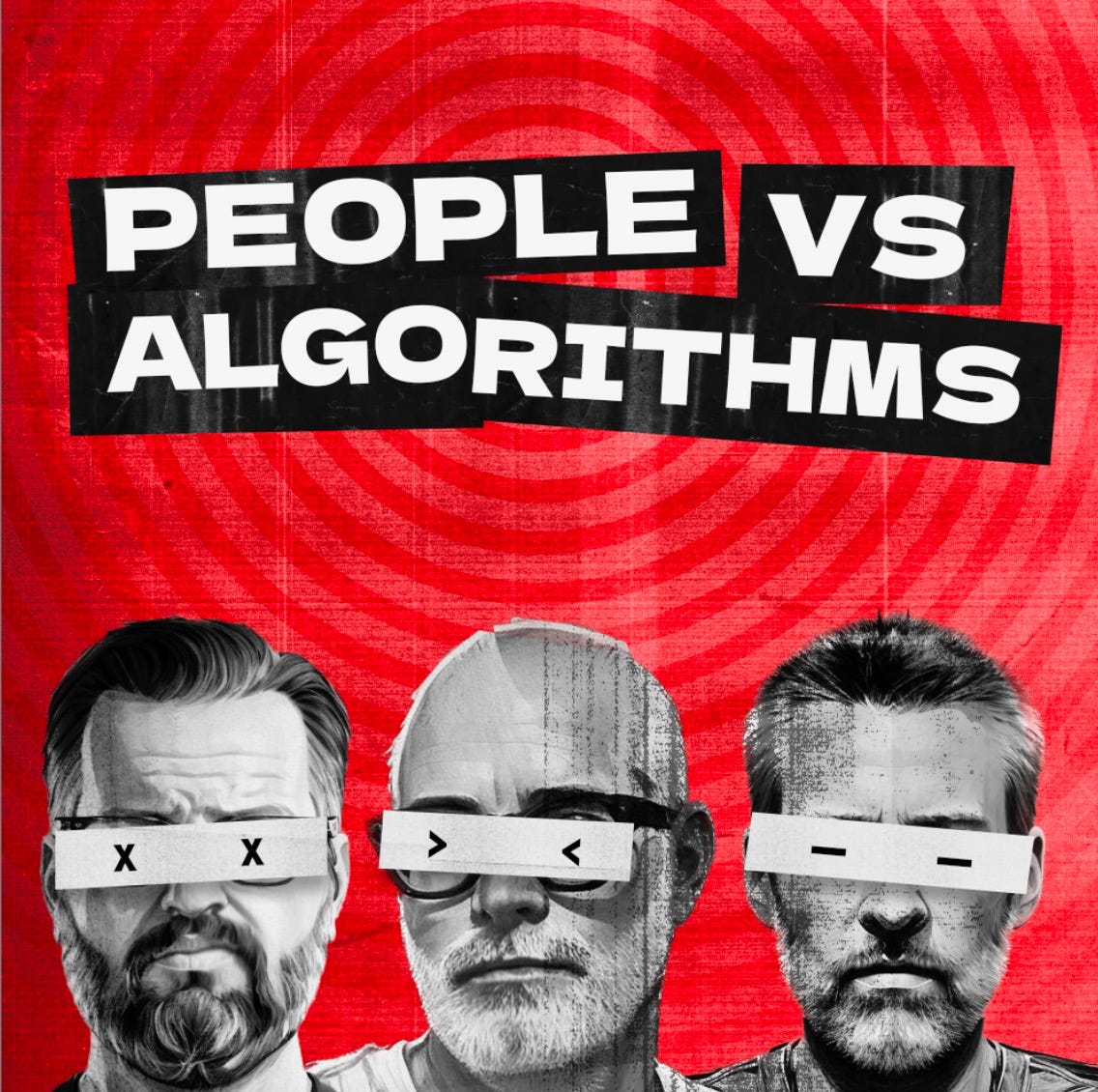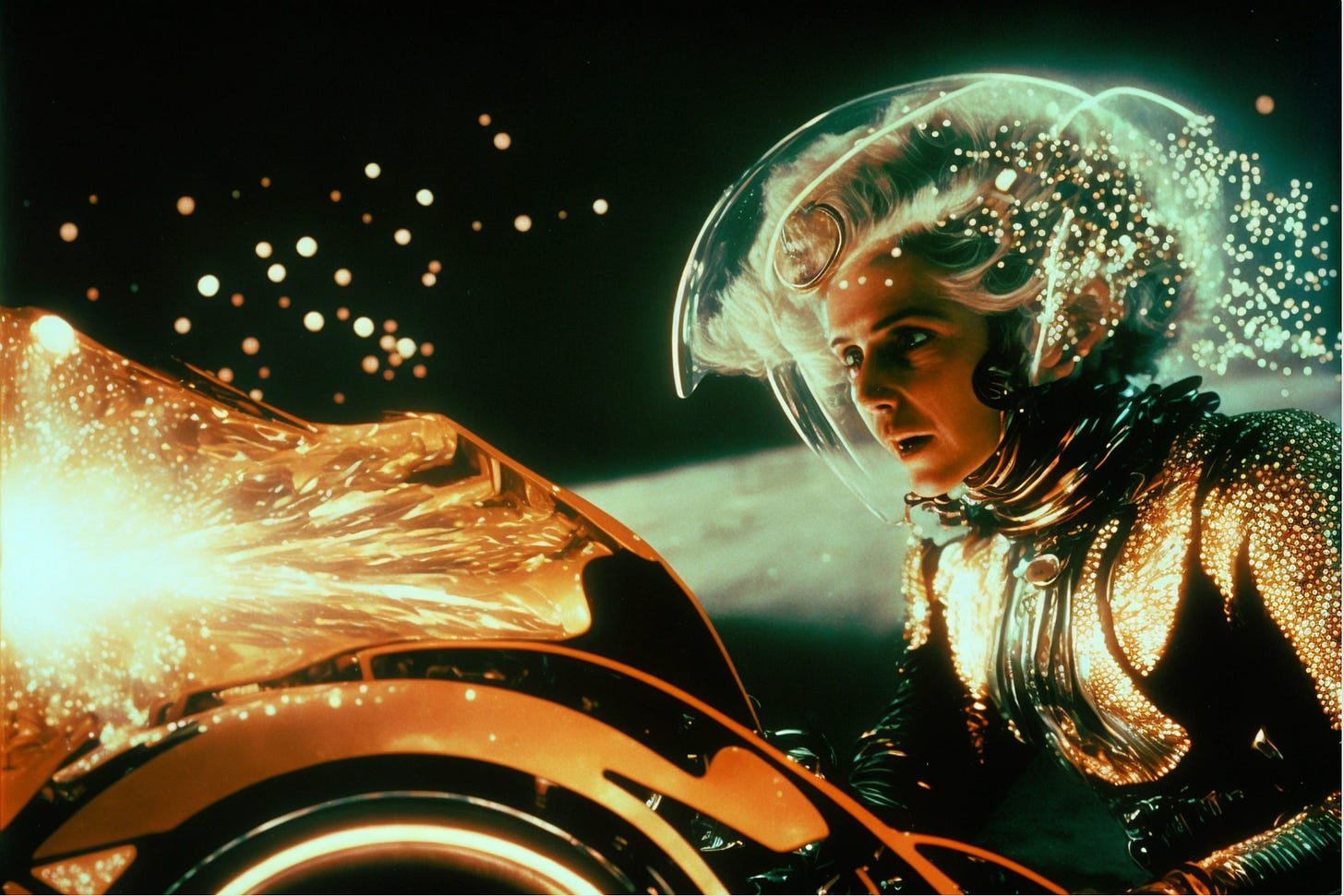Everything Ends
The AI era begins. Will we navigate the change better? Plus...advertising never ends, it just gets worse.
Welcome to People vs Algorithms #55.
I look for patterns in media, business and culture. My POV is informed by 30 years of leadership in media and advertising businesses, most recently as global President of Hearst Magazines, one of the largest publishers in the world.
Everything ends
Some years ago, I was driving in LA and looked up to a billboard announcing the final season of HBO's darkly funny series, “Six Feet Under.” Above a vintage hearse speeding toward a desert horizon, the headline read “Everything. Everyone. Everywhere. Ends.” The perfect line, I thought. A genius sign-off for a beautiful show about to enter its final act.
The corollary, of course, is, everything begins. Like how that show, one might argue, ushered in the "Golden Age" of television in the early 2000s, pushing the boundaries of what good storytelling on TV looked like, including its groundbreaking portrayal of LGBT characters. Love the way everything about TV is just better now? Thank Six Feet Under.
It came to mind as I was thinking about the year ahead. 2023 as end and beginning. If you work in media you’ve been navigating stomach-turning change for quite some time. But the 2023 inflection feels epochal. There's something deeply transitional in the air.
My sense is this. The ebbing social wave bookmarks a period that forced huge adjustments in how we see the world. Probably the most significant was learning just how addictive this new media type could be, its recognition that YOU are the most important character in a modern media ecosystem.
We’ve slogged through second-order consequences of a world carrying algorithmic media machines in our pockets. Let’s atleast agree we now have a good sense of the challenges.
We’ve reoriented our media system from context to data and watched advertising become automated, particalized and pushed to a cold, performance endpoint.
More broadly, the disruptive impact of digital and its demand-based world order has now made a clean sweep through all media types. The latest, it’s devastating impact on television.
It's taken me a long time to grok the previous chapter, starting with the impact of media’s exploding boundaries. When everyone can make media, when every surface can carry it, its value simultaneously plummets and shoots to the sky. Suddenly it is more than a thing media companies make, it becomes part of our interpersonal vocabulary and identity, the front of commerce, of everything, really. Media is now just the noise of everyday electronic chatter while still being that elusive thing that pulls us to the campfire, defines a moment, concentrates attention and produces diamonds. Even if the value is now more transitory.
What's most disruptive is how this plays out in its economics. Media's monetizable value is found in owning a scarce path to attention. And the catalog. It's getting harder to make that pitch. It's like valuing the air around us, or water to fish.
On to the next
The thread that runs through all of this is, as it always does, is our expanding choice and control over everything; from media (streaming) to product customization (NikeID) to service innovation (Amazon, Uber) to the self-mobilizing power of groups to direct collective energy (you name it). The notion of the "consumer is in control", a hackneyed saying in the marketing world for as long as I can remember, has reached a new apex largely on account of how tech has given us superhuman control of the immediate world around us. The era of peak control is approaching, the next wave driven by an AI layer that will front-end a new wave of personal empowerment. This time, control is shifting from “choose do you want to consume” to “what do you want to make, right now.”
Indeed, media’s next epoch will be defined by AI’s ability to power wholly new ways of creating and accessing information, where the machine does more and more of the heavy lifting, assembling, sorting and organizing for us. The result: interfaces to information are about to go through profound change, one with massively disruptive consequences to any owner of a media or commercial distribution point.
A favorite new narrative of the business press is AI’s threat to the Google search hegemony. The hyperbole is probably justified, even if incumbent titans like Google, Amazon, Meta and Microsoft are the only ones with the sophistication and means to weather the storm. The more important big-picture question is how this sudden ability to pluck customized narrative responses from reams of digitized human knowledge, in ways that feel indistinguishable from human interaction, represents a transition point to a new way of accessing information and what business models eventually underpin it. This new paradigm will continue to advantage the user, terrify media incumbents and IP holders and inevitably and justifiably lead to scrutiny of people and organizations who actually understand and shape how it works. Our cultural machinery is becoming ever more leveraged.
We have had but a few months to see how AI will start to trickle into the supply side of the market. In the last month, I have seen examples in media creation (see how Red Ventures is using AI to automate content creation), new ad platforms that will use AI to chase human effort out of the entire process of ad creation to media buying and optimization, crazy new AI-powered image and video tools, etc. Right now, open AI models are being jammed into every conceivable workflow.
Better at change?
But back to 2023. As we free ourselves from the mental shackles of social media, and... just in time to bounce back from an unfortunate crypto date, along comes an incredibly seductive new partner. We are hopeful and curious because we always are about glistening technology. This time, we assure ourselves, we will go in eyes wide open. Of course, that’s not how things really work when economic incentives drive unscrutinized innovation across a million points of light.
But, and maybe this is wildly optimistic, I suspect we are becoming better at processing the change coming at us. It seems to me we are living with far greater awareness, a sensitivity to the consequences of our technological interdependencies. This does not mean that we are free from its side effects. We will perpetually wrestle with the deep social and political consequences of technology, media and communications shifts.
It's different in 2023 than it was in 2013 or 2003 because our level of awareness of the second-order impacts is so much more sophisticated. We have raised a generation of humans that soak in media. We’ve witnessed the rippling impacts of systemic media change. When I speak to young people, the native level of awareness of how media works is astounding. Media theory has been freed of its academic shackles. The theorists are all around us.
It’s 2023 and we are opening a bold new chapter on how technology enamors, emancipates, and enslaves. People vs algorithms.
This is your phone on wheels
On to other beginning and ends at this dawn of this New Year. CES has wrapped and this one suggests a couple of things to me. It feels like we've reached a natural maturation of mobile phone innovation, both hardware and software. My new iPhone is just like my old one. And as this evolutionary cycle winds down, the baton is passed to the automobile. Cars are the new iPhone. Batteries, silicon, software and sensors, now on wheels. Every car on display at CES was electric. BMW's new iVision Dee, literally positioned as "The ultimate digital companion," stole the show packing a crazy 280 screens inside and mostly outside so your car now comes in any color or pattern your heart desires. More screens, more surface area. More media. And Sony's gonna help make Honda make something just as cool just like they helped Swedish telecommunications company Ericsson make mobile phones two decades ago. Afeela good.
RIP TV
And because you are too busy looking at screens everywhere, except the screen you used to always look at, cable television, you already realize that the end is coming quicker than we may have thought. Unless you watch NFL but that will only sustain you for so long. Even Bob Iger admits that the end is fast approaching.
A couple of points here. NFL represents 82 of the 100 most-watched programs on TV in 22, Sportico reports. What's more, total primetime network audience on any US network barely exceeds 5m viewers (NBC leads at 5.2m, down 7% from 2021. Source: Variety). It's far worse if you cut out the old people. Per Rich Greenfield via Variety, there is only one network with one million viewers in primetime against adults 18-49, and five above 400k.
First, digital came for newspapers and magazines. Many weathered the storm even if the economics of digital businesses struggled to replace traditional models. Cable and network TV companies don't enjoy the same opportunity—few can become scaled streamers, streaming wipes out glorious historical profits, and digital replacements are tiny little businesses in comparison.
And a few nice words about advertising
And what about advertising in '23. Well, it’s the one thing that never behaves by the Six Feet Under Rule. It never ends. Like a cockroach, it keeps breeding and finding crumbs under the next cabinet. With one big caveat and I hesitate to say this because I have spent so much time on the problem and that's kinda sad.
There's only one line to draw on a chart mapping advertising’s trajectory from the beginning of the internet to now... it slopes down and is labeled "sucks more over time." Ninety percent of banners suck. Ironically, the ones we used to complain about most, retargeted ads, are the most useful of the lot. At least they remind me where I was. Native ads are a lie. Floating video players on web pages are an affront to humanity. Content marketing usually insults your intelligence. Search ads didn't suck but now kinda do. Weaned off of interruptive TV and radio advertising, advertising in my media feed sucks too. And many of the great creatives that made advertising great, realize it sucks and are leaving or only working on the Progressive Insurance account. Perhaps only next-level PR, rare, artfully crafted branded content, and the odd TV spot are the last proud bastions of the art. I’ll take a well-placed affiliate link.
Do I have anything good to say about it? Yes. Advertising is merging with distribution now and the next generation of digital media hackers and funnel optimizers are creating the new art. They are creative systems thinkers and look nothing like the old guard. At best, they can make or break a business.
So where are we at? Well, social media is still here, though "those" people can now join print publishers, agencies, and more recently, old-fashioned TV people in lamenting the good 'ole days.
And the ones that are laughing in the end, as always, are the NERDS. This time it’s the tiny population of them that control our future because they’re the only ones that know how all this AI stuff really works. We really hope they put in controls to prevent the robots from doing something bad to us, like turning us into paperclips (see below).
Wait, lest I sound overly pessimistic... what's so good about all of this, you ask. Perhaps you can take comfort from the fact that never have we—the consumer, the voter, the activist—had more power. Our institutions, while struggling to keep up, have proven pretty resilient. Log on. Go live right now. Say what you want to say, watch what you want to watch, with or without ads. Drive your phone. Even your baby carriage is self-driving now. The ozone is healing. You’re gonna get your arms around "your data," and even if there's a bit of leakage, is it the end of the world? Twitter will be fine and if it's not, use something else. People will. Or invent a better alternative. Around every corner is a new technology-powered innovation that's gonna give you more agency. Maybe even a new 3D-printed kidney.
And here's why we are at an inflection point. As fast as this all is moving, what we have learned over the past few difficult years is our capacity to digest change, particularly technological ones, is growing alongside our fantastic inventions. It may not always be elegant, but 2023 feels like a year where we can look back with much more collective wisdom. People fought the algorithm and the people won. There will be more battles and the robots are getting smarter. So are we.
Things end. New things begin. Here's to the power of collective wisdom in 2023.../ Troy
New podcast is out. CES wrap. Why are people freaking out about AI. Alex moralizes. White guys with beards. Get it here.
Related
1. Disrupting creativity: Generative AI imagined a movie that had not been made… with a little help from people who spent years rendering the future the old-fashioned way. How are we going to navigate this insane new reality? “This Film Does Not Exist” (NYT)
What will it mean when directors, concept artists and film students can see with their imaginations, when they can paint using all the digitally archived visual material of human civilization? When our culture starts to be influenced by scenes, sets and images from old films that never existed or that haven’t yet even been imagined?
I have a feeling we’re all about to find out.
2. Early AI innovation will target all manner of process efficiency, perfectly timed for this period of economic rationalization. Further out, the impact is anyone’s guess.
I am seeing it everywhere, particularly in media and marketing realms. Fast movers are looking at deploying AI tech in a few key areas: 1) tool enhancement (Office apps, new writing tools, image creation, video editing, code writing) 2) content navigation and discovery (much talk about Google Search disruption with companies like Neevia is leading case here, but look for evidence around any access point to information) 3) process automation (automating basic content generation, visual asset creation, media mix allocations and performance optimization)
Takes on AI range from its power as a creative enhancer and productivity booster (see Andreessen) to a massive displacer of labor with, at the far end of a continuum, dystopian consequences. As we approach a state of full Artificial General Intelligence in which the capability of AI equals and eclipses humans—despite the awe-inspiring capabilities of ChatGPT and generative AI, we are likely a long way from this frontier—the second to N order social implications are staggering. Mike Solana does a little prognosticating in "Chaos (A Future History of Artificial Intelligence)." We all can agree there's a lot to think through:
Our future is not a world of robots killing humans (yet), or even people killing humans with robots (yet). Our future is a world of robots blending in with humans, taking over for humans, quietly shaping the world of humans, while guided by a very small handful of powerful human programmers. There will be hybrid work. There will be bizarre second and third order effects at the level of human culture, religion, and politics. There will be an overabundance of potential applications for AGI in every field, each of them presenting new potential applications, and in aggregate their impact is impossible to predict. The future will be messy. The future will be confusing. Dystopian for some, and utopian for others, I’m starting to think the future will look a little bit like Blade Runner.
Meanwhile, a few AI startups with momentum. (The Information)
Adept AI Labs. Building a browser extension that will automate web information retrieval tasks with natural language queries taking a high-level request like apartments for rent in Brooklyn at price point x, and returning specific results to that query.
AI21 Labs: In addition to writing (WordTune) and content summarization tools (WordTune Read), AI21 Studio offers these tools and more to embed into your applications. All of which is to say that basic AI capabilities are quicky spreading to all digital interfaces.
Character AI: Create and interact with chatbots emulating your favorite historical figures (Socrates to Churchill), contemporary personalities (Elon) to subject matter experts (The German Tutor).
3. TikTok embraces disruptive price strategy. Welcome pressure for performance marketers.
Figures shared by New York-based media agency VaynerMedia from 2022 show that the cost to obtain 1,000 impressions from video advertising on TikTok is almost half the price of Instagram Reels, a third cheaper than Twitter and 62 per cent cheaper than advertising on Snapchat.
4. The best obituary of SPAC era yet. Matt Levine breaks down the hard math of SPACS.
5. How to manage creative talent and more. A relaxed, broad conversation between Bob Iger and A16z's Sonal Chokshi, and Chris Dixon. Iger is terrific. Worth listening to. Creators, Creativity, and Technology with Bob Iger
7. Why we get our best ideas in the shower? (Wapo)
Marc Ruxin is a big music fan and releases a list each year of his fav stuff, the Bestest.
This year he highlights this banger from Bonny Light Horsemen and I couldn’t agree more. Beautiful album. Beautiful song.
On one of the best songs of the decade, the opening track “Exile,” Eric Johnson sings: “Love, love love, / to lie with you again / beating of my heart / the winging of a dove.” The song rolls along so lightly it almost sounds like the perfect weather it is meant to approximate. There is always one record every year that gets immediately under my skin and just stays there, and this year it was Rolling Golden Holy.









